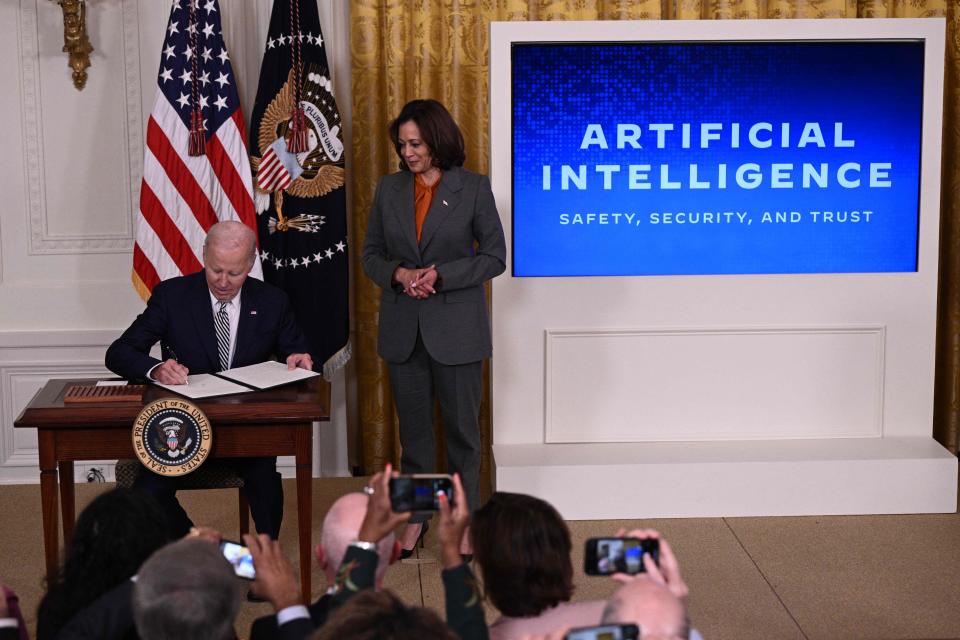Bills on artificial intelligence filed in lead-up to Florida legislative session
- Oops!Something went wrong.Please try again later.
- Oops!Something went wrong.Please try again later.
As artificial intelligence technology advances, so do concerns about its misuse. In the lead-up to Florida’s 2024 legislative session, which begins Jan. 9, this is clear from the bills filed over the use of AI-manipulated media.
For instance, one proposal (HB 757) would make several changes to defamation law, including allowing someone to sue if content made or modified by artificial intelligence leads a viewer to believe something false about a person that’s “highly offensive.”
Meanwhile, another measure (SB 850) would require disclaimers on political advertisements that use AI content. Yet another (SB 972) would create an Artificial Intelligence Advisory Council and says the Legislature has the intent to create a "statewide uniform policy regulating the public and private use of artificial intelligence."
But legal and AI experts say it's a complicated area to regulate. The technology is so new and rapidly evolving that there’s numerous legal uncertainties, particularly related to the First Amendment.
“Law and artificial intelligence are now starting to merge and confront each other,” said Sheldon Jacobson, a computer science professor at the University of Illinois at Urbana-Champaign. “This is the Wild West, and it continues to be the Wild West. … We’re just at the beginning."
It’s not just Florida lawmakers that are taking a stab at AI regulation: It’s a focus for policymakers across the nation and world. European Union officials just agreed to sweeping AI regulations earlier this month.
Concerns have been around for years, even decades. “2001: A Space Odyssey” with its scary supercomputer HAL (for "heuristically-programmed algorithmic computer") was one of the highest-grossing films of 1968, after all.
But the release of groundbreaking products over the last couple years — like question-answering, essay-writing ChatGPT and a slew of AI image generators — have intensified worries.
A summer Pew Research Center survey showed that more than half of Americans are more concerned than excited by artificial intelligence, substantially higher than the previous year.
But there’s also unease that doing too much in the United States may suffocate innovation and development, putting the country behind others that are unbidden by regulation.
DeSantis himself recently warned that regulations could put the United States at a "competitive disadvantage" with China. But he also said there were "perils" with the technology and that "there's got to be limits."
"We've got to make sure that China is not going to be able to use it to have a competitive advantage against us or use against us," he told conservative radio talk show host Erick Erickson at an August conference. "But that we are also protecting the health of our society."
The country is ahead in the AI advancement race, Jacobson said, and “nobody wants (competing nations) to pass the United States’ capabilities."

New legislation adds AI concerns to proposed defamation overhaul
The legal and development concerns have spilled into the AI “false light” measure, filed by state Rep. Alex Andrade, a Pensacola Republican.
Andrade also sponsored legislation last session that would make it easier to sue journalists and others for defamation. It faced powerful pushback, most notably from conservative media outlets and officials, who said it would have chilling consequences on free speech.
Despite being a policy priority of Gov. Ron DeSantis, who was gearing up for his presidential candidacy, that legislation didn’t go the distance.
This year’s bill is scaled down, though it’s already caught criticism that it too would have a chilling effect. The AI provision is a new addition entirely.
“With the use of deepfakes now, there’s plenty of circumstances where someone creates a video that makes somebody look like they’re doing awful things, things that would absolutely harm their reputation and traumatize them,” Andrade said.
Deepfakes are visuals altered to make someone say or do something they didn't. They've been widely used in recent years, especially in politics.
DeSantis' presidential campaign came under fire over the summer for using fake images of former President Donald Trump hugging and kissing Dr. Anthony Fauci, who for multiple years was the face of the nation's pandemic health response.
Andrade attributed his motivation for the provision to his concerns as a father. He heard about young children’s images being altered in sexually explicit ways, something that’s already a crime and able to be sued over.
His bill, though, would apply to any deepfakes that fall under "false light." Andrade said his bill “reconstitutes the claim of false light in that one specific scenario.”
The legal doctrine of false light, which isn't recognized in Florida, falls under invasion of privacy. Generally, a person can be liable when "portraying (another) individual unflatteringly in words or pictures as someone or something that person is not," according to the Free Speech Center at Middle Tennessee State University. But the Florida Supreme Court has said such suits are too similar to defamation actions.
Bobby Block, executive director of the First Amendment Foundation, told the Pensacola News Journal that there are legitimate concerns with AI being used to create fake content, but there are also legitimate uses of AI, such as in satire and other comedy.
"It opens up a can of worms," he said.
Jacobson said he didn’t think the measure would be effective for long. He said he worried such laws could have unintended consequences: “I believe that we have to be very careful when we craft laws around AI, because it’s such a fast-moving target right now.”
Lyrissa Lidsky, the University of Florida's Raymond and Miriam Ehrlich Chair in U.S. Constitutional Law, said the measure was “praiseworthy” but also shared concerns about unintended effects, such as on parody, and how broadly it can be interpreted.
Andrade said he disagrees with the criticism and added it would be “dishonest for anybody to say this would harm free speech.” Going after parody, he said, "was the further thing from my mind."
"If the evidence shows it's parody, then it's not a 'false light' claim," he said.
Last year's defamation bill failed: DeSantis-desired defamation legislation didn't go the distance. Here's why
DeSantis campaign use fake AI images: 'Wild West' of AI campaign warfare: DeSantis launches attack ad with fake Fauci image

Bill would require AI disclaimer if used in political ads
A bill filed for this legislative session would require disclaimers on AI-content in political advertisements that “depict a real person performing an action that did not actually occur."
Sen. Nick DiCeglie, R-Indian Rocks Beach, who filed the bill, said in a press release that the bill was constitutionally sound, not running afoul of the First Amendment because it didn't prohibit or limit content.
“The increasing access to sophisticated Al-generated content threatens the integrity of elections by facilitating the dissemination of misleading or completely fabricated information that appears more realistic than ever,” DiCeglie said in a provided statement.
He said violations could come with an up to $52,500 fine per count for the first three offenses, followed by fines up to $57,500 for subsequent ones.
A similar bill (HB 919) was filed in the House by Miami-Dade Republican Rep. Alex Rizo.

And a bill filed by Sen. Joe Gruters, R-Sarasota, would create an Artificial Intelligence Advisory Council and place it within the Department of Management Services. A goal of the council: Making administrative and legislative recommendations on AI regulations.
It require state agencies, "using money appropriated ... by the Legislature," to provide a report about their use of AI by July 2025.
The bill says local governments cannot develop their own artificial intelligence regulations in the meantime, as it's the "intent of the Legislature to create a statewide uniform policy."
The Pensacola News Journal contributed background. This reporting content is supported by a partnership with Freedom Forum and Journalism Funding Partners. USA Today Network-Florida First Amendment reporter Douglas Soule is based in Tallahassee, Fla. He can be reached at DSoule@gannett.com. On X: @DouglasSoule.
This article originally appeared on Tallahassee Democrat: Florida lawmakers may take up AI legislation in 2024

